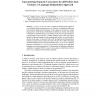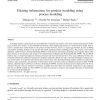140 search results - page 9 / 28 » Formal Modeling for Product Families Engineering |
109
click to vote
SOCO
2010
Springer
14 years 11 months ago
2010
Springer
Abstract. In grid-based scientific applications, building a workflow essentially involves composing parameterized services describing families of services and then configuring the ...
119
click to vote
TOOLS
2009
IEEE
15 years 8 months ago
2009
IEEE
A software product line (SPL) is a family of related program variants in a well-defined domain, generated from a set of features. A fundamental difference from classical applicati...
126
click to vote
SPLC
2010
14 years 11 months ago
2010
Abstract. Feature modeling is a technique for capturing commonality and variability. Feature models symbolize a representation of the possible application configuration space, and ...
110
click to vote
DKE
2007
15 years 1 months ago
2007
A product model is a formal and structured definition of product information. The most common procedure for defining a product data model is to first describe the business and/...
ICFEM
2009
Springer
15 years 8 months ago
2009
Springer
It is believed that reusability in formal development should reduce the time and cost of formal modelling within a production environment. Along with the ability to reuse formal mo...


